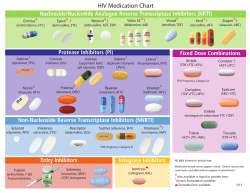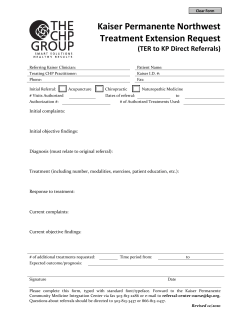
adults How to Use Birth Control Pills
young adults Taking birth control pills is one of the most effective ways to keep you from getting pregnant if you take them correctly. Here’s how to use them: 1. Start your pills as checked below: Start today. During the first 7 days of pills, use a condom or diaphragm, or abstain from having sex. You are protected from pregnancy after taking the pills for one week. If you miss your first period, come in for a pregnancy test. Start on the first day of your next period. You are protected from pregnancy right away. Start on the first Sunday after the first day of your next period. During the first 7 days of pills, use a condom or diaphragm, or abstain from having sex. You are protected from pregnancy after taking the pills for one week. 2. Take one pill every single day. HEALTH EDUCATION How to Use Birth Control Pills INSTRUCTIONS FOR TEENS AND YOUNG ADULTS 3. Take your pill at about the same time each day. 4. Even if you have some bleeding or nausea (upset stomach) in the first three months, keep taking your pills. 5. If you forget to take one pill, take it as soon as you remember. 6. If you forget to take two or more pills, and you are sexually active, you are at risk for getting pregnant. See the part of this tip sheet called “What if I forget to take a pill?” 7. Always use a condom when you have sex. Using a condom helps protect you against sexually transmitted diseases (STDs). By itself, the Pill does not protect against STDs. 8. Call Kaiser Permanente if you have questions or problems with the Pill, or if you need Emergency Contraception Pills (ECP’s.) How does the Pill work? While you are taking the Pill your ovaries don’t release an egg, so you can’t get pregnant. Because preventing ovulation also helps to lessen heavy bleeding and menstrual cramps, sometimes young women who aren’t having sex take the Pill, too. Is the Pill safe? For younger women, birth control pills are extremely safe. Major side effects are very rare. Taking the Pill does not increase your risk of breast cancer or make it more difficult for you to get pregnant later in life. And taking the Pill is safer than being pregnant! In addition to providing excellent birth control, there are other health benefits. • periods are more regular • periods are shorter, with less bleeding and cramping • less acne • reduced risk of developing uterine, colon, and ovarian cancer • reduced risk of bone loss and less hirsutism (extra body hair) • reduced risk of fibrocystic breast disease (non-cancerous lumps) How many pills do I take? Take 1 pill every day for 28 days in a row until you finish the entire package. Your period will usually start when you reach the 24th pill. After you take the last pill, start a new package the very next day. When do I take the Pill? Take the Pill at the same time every day. To remember to take the Pill, link it to something you do every day like brushing your teeth, eating a meal, or going to bed. The Pill only works when you take it every single day. What about side effects? Weight Teens worry about gaining weight. Sometimes a teen might gain or lose some weight on the Pill, but most teens actually stay at the same weight. Bleeding between periods You might get some spotting (irregular bleeding). After a few months, your periods will become lighter, and spotting should lessen. Nausea or headaches You might feel a little sick to your stomach when you first start taking the Pill. If this happens, try taking your pill after eating. The Pill can also cause headaches in some people. Don’t stop taking the Pill without calling your doctor first. If spotting, nausea, or headaches continue into your 3rd month, or if it’s serious enough that you’re thinking of stopping the Pill, call your doctor at Kaiser Permanente before you make any changes. (Stopping the Pill suddenly can cause spotting and bleeding, and leave you without birth control until you make a new plan.) Pill warning signals Some of the following may be signs of a serious medical condition. If you experience any of these symptoms after starting BCPs, stop taking the pills and call your provider. Youngest women are at lowest risk. • Severe abdominal pain. • Severe chest pain, arm pain, shortness of breath, coughing up blood. • Severe headaches, vomiting, dizziness, faintness, muscle weakness or numbness, or speech disturbance. • Vision change: blurred, flashing lights, or visual loss. • Severe leg pain. What if I miss a period? If you miss your first period after starting the pills, and if you are sexually active, come to Kaiser Permanente for a pregnancy test. After several months on the Pill, your periods will become lighter. You may even miss a period. This can be normal while taking the Pill. But if you have missed pills and you don’t get your period for two months in a row, it is important to come in for a pregnancy test right away. What if I forget to take a pill? • If you forget to take one pill, take it as soon as you remember no matter what time it is. • If you forget to take two pills, and you are sexually active, you are at risk for becoming pregnant. Take 2 pills (6 hours to12 hours apart) for the next 2 days, and then finish your pack of pills as usual. Either do not have sex (the safest thing to do) or use a condom or other method like a sponge or diaphragm until you have taken 7 days of pills again. • If you miss three or more pills, and you are sexually active, you are at more risk for getting pregnant. Throw out the pack of pills and start a new pack that day. Either do not have sex (the safest thing to do) or use a condom or other birth control method until you have taken 7 days of pills again. • If you’ve missed pills and had sex in the last 5 days without using a condom, or other method of birth control, call Kaiser Permanente for emergency contraception pills. • If you miss pills, you will notice some spotting. This will go away after you get back on schedule. Another way to take the Pill: Continuously Did you know that you can safely take the Pill all the time and skip having your period? By taking one pill every day, and starting a new pack of pills every 3 weeks, you can protect yourself against pregnancy and safely skip your period. Just think – no more cramps or PMS. How to take the Pill continuously Take 1 pill every day as usual for 3 weeks. When you get to the last week of placebo pills (sugar pills), throw away the pack and start a new pack of pills. This means you will start a new pack of pills every 3 weeks, instead of every 4 weeks. You can take the Pill this way without having a period for as long as you like. Some spotting is common, especially during the first 3 months. After that, if you get bleeding, go off of the Pill for 3 days and then start taking them again every day. But is it safe? Taking pills continuously is safe and easy to do. It is not necessary to have a period each month. Don’t worry – blood isn’t This information is not intended to diagnose or to take the place of medical advice or care you receive from your physician or other health care professional. If you have persistent health problems, or if you have additional questions, please consult with your doctor. © 2002, The Permanente Medical Group, Inc. All rights reserved. Regional Health Education. 011061-188 (Revised 6-10) RL 6.8 backing up in your uterus. Taking the Pill this way changes your hormones and thins the lining of your uterus so that you don’t have a period. What about emergency contraception? Emergency Contraception Pills (ECPs) can prevent pregnancy after you have had sex without using birth control, or if birth control fails (the condom breaks, you miss pills). Call your doctor at Kaiser Permanente to get a prescription for ECPs before you need them, or as soon as possible after having had unprotected sex. You can take ECPs for up to 5 days after you have unprotected sex, but the sooner you start taking ECPs, the better they work. For more information, check out: • The Kaiser Permanente Web site: kp.org • Kids Health, Teen Site: kidshealth.org/teen • “Go Ask Alice,” Columbia University’s Question and Answer Site goaskalice.columbia.edu/ • The New Teenage Body Book, Wibbelsman and McCoy Other resources • Association of Reproductive Health Professionals arhp.org • American College of Obstetricians and Gynecologists acog.org • Planned Parenthood plannedparenthood.org • Contact your Kaiser Permanente Health Education Center or Department for information, programs, and other resources. • If you are being hit, hurt, or threatened by a partner or being pressured to have sex, it can seriously affect your health. There is help. Call the National Teen Dating Abuse Helpline at 1-866-331-9474 or connect to loveisrespect.org.
© Copyright 2025











